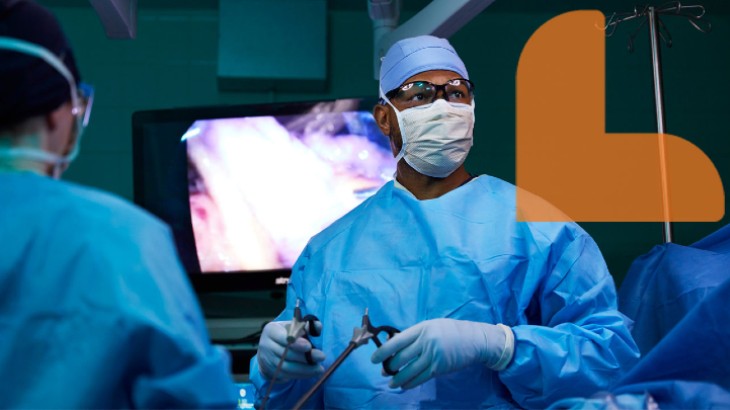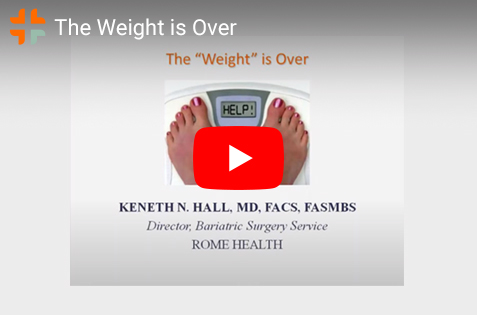
Bariatric Surgery for Long-Term Weight Loss & Medical Weight Loss
Rome Health bariatric surgeon Keneth Hall, MD, FACS, FASMBS is accepting new patients for medical weight loss surgery and weight loss surgery, including laparoscopic gastric bypass, sleeve gastrectomy, conversions and revision procedures. Dr. Hall is board certified by the American College of Surgeons and is a fellow of the American Society for Metabolic and Bariatric Surgery.
Appointments may be made by contacting Rome Health Surgical Specialists at (315) 338-7040. The office is located at the Rome Health Medical Center on the hospital's main campus for your convenience. Use the East Oak Street parking lot and enter the Medical Center through the Bartlett entrance.
Severe obesity is a chronic condition that is difficult to treat through dietary modification and exercise alone. Surgical intervention has been shown to be more effective than non-surgical interventions for sustained weight loss.
Rome Health Surgical Specialists
1500 N. James St. Rome, NY 13440
Patient Education Video
Individuals who are considering weight loss surgery can learn more information in a presentation from Dr. Hall.
Who are Candidates for Weight Loss Surgery?
Candidates for weight loss surgery are based upon body mass index (BMI), a measure calculated using height and weight, as well as obesity-related conditions. Click here to calculate your BMI.
- BMI ≥ 40, or more than 100 pounds overweight.
- BMI ≥ 35 and at least one or more obesity-related co-morbidities such as type II diabetes, hypertension, sleep apnea and other respiratory disorders, non-alcoholic fatty liver disease, osteoarthritis, lipid abnormalities, gastrointestinal disorders, or heart disease.
- Inability to achieve a healthy weight loss sustained for a period of time with prior weight loss efforts.
To be successful, patients must be dedicated to a lifestyle change and life-time follow-up appointments. Generally, people can expect to lose 70 to 78 percent of their excess body weight within 18 months depending upon which procedure is best for them.
Studies show that medical problems, such as diabetes, high blood pressure, acid reflux and many other medical conditions may resolve after weight-loss surgery.
Experienced Bariatric Surgeon
Dr. Hall has more than 12 years of bariatric surgical experience and has been involved in thousands of cases.
Before joining Rome Health in 2019, Dr. Hall was a bariatric surgeon at NYU Long Island, where he completed his fellowship training in minimally invasive, bariatric and robotic surgery. He served as the hospital’s director of bariatric quality improvement as well as director of surgical simulations.
Dr. Hall earned his medical degree at Howard University College of Medicine, Washington, D.C., in 2005. He completed his general surgery internship and residency at SUNY Stony Brook Medical Center. Committed to being on the leading edge of surgical advances, Dr. Hall has completed numerous specialized certifications and is an American College of Surgeons verified bariatric surgeon.
From the American Society for Metabolic and Bariatric Surgery (ASMBS)
Why Surgery?
Obesity is a common disease in the United States and the world. When a person has severe obesity, as with many other medical problems like heart disease and kidney disease, surgery can be the most effective treatment.
Many patients with obesity have tried to treat this on their own, with diet and exercise. Many have had some success, only to have weight regain. More often, patients have little to no success with diet and exercise alone. This is not a result of lack of willpower or the wrong diet. When a patient has a body mass index (BMI) greater than 35, their chances of reaching a normal body weight for a lasting period of time is less than 1%. That’s why surgery is an option for patients with severe obesity.
Weight loss surgery does not just treat the disease of obesity, but it treats other conditions like diabetes, heart disease, high blood pressure, arthritis, and acid reflux. In addition, surgery greatly reduces the risk of death from cancer, diabetes, heart disease, and other diseases.
How Does Weight Loss Surgery Work?
Weight loss surgery, also known as bariatric surgery, such as gastric bypass and sleeve gastrectomy work by changing the anatomy (or position) of the stomach and small intestines. This causes changes in appetite, satiety (feeling full), and metabolism (how the body burns calories).
Many of the hormonal signals that cause weight gain or inability to lose weight are affected by these procedures, and it becomes easier to lose weight. But this still requires a healthy diet and a good exercise routine. These procedures are tools to treat a chronic disease, and cannot work alone.
Long Term Weight Loss
Around 90% of patients after bariatric surgery lose 50% of excess body weight and keep this extra weight off long-term.
When patients start to lose weight after surgery, they also feel more energetic, less pain, and more enthusiasm for doing things they have not done in years. The significant and rapid weight loss after surgery can lead to changes in hormones and lead to even more weight loss. Staying consistent with an exercise routine can improve weight loss and weight stability after surgery.
Living Longer After Weight Loss Surgery
In large scientific studies of hundreds of thousands of patients, weight loss surgery has been shown to lower a person’s risk of death from any cause by over 40 percent.
Decades ago, weight loss surgery was seen as high risk and the rewards were seen as mostly cosmetic. This is completely incorrect. The risk of death due to surgery is very low in the first year after surgery, about the same as gallbladder surgery. Surgery for weight loss lowers the risk of death related to many diseases including heart disease (40% lower), diabetes (92% lower), and cancer (60% lower) are also significantly reduced. Comparing the risks of surgery to the benefits of surgery makes the decision for surgery much easier to make
Blue Distinction Bariatric Surgery Center
Blue Distinction programs are designed to recognize doctors, hospitals and health care facilities for their outstanding quality of care, service, and patient safety when it comes to certain specialties. So, consider a facility designated as a Blue Distinction Center for Specialty Care. The overall goal of Blue Distinction programs is to help consumers find both quality and value for their specialty care needs, on a consistent basis, while encouraging healthcare professionals to improve the overall quality and delivery of care nationwide. Rome Health is proud to carry several Blue Distinction honors include our Bariatric Program lead by Dr. Hall.
Designated as a Surgical Quality Partner
Pictured above is Keneth Hall, MD, FACS and his team. In June of 2024 they received their designation as a Surgical Quality Partner from the American College of Surgeons for Bariatric Surgery. This title demonstrates that Dr. Hall's team along with Rome Health is dedicated to surgical quality and committed to maintaining the highest standards in surgical care. Read on to learn more about our fully accredited comprehensive bariatric surgical center.
Weight Loss Procedures
Gastric Bypass
The Roux-en-Y Gastric Bypass – often called gastric bypass – is considered the ‘gold standard’ of weight loss surgery.
There are two components to the procedure. First, a small stomach pouch, approximately one ounce or 30 milliliters in volume, is created by dividing the top of the stomach from the rest of the stomach. Next, the first portion of the small intestine is divided, and the bottom end of the divided small intestine is brought up and connected to the newly created small stomach pouch. The procedure is completed by connecting the top portion of the divided small intestine to the small intestine further down so that the stomach acids and digestive enzymes from the bypassed stomach and first portion of small intestine will eventually mix with the food.
The gastric bypass works by several mechanisms. First, similar to most bariatric procedures, the newly created stomach pouch is considerably smaller and facilitates significantly smaller meals, which translates into less calories consumed. Additionally, because there is less digestion of food by the smaller stomach pouch, and there is a segment of small intestine that would normally absorb calories as well as nutrients that no longer has food going through it, there is probably to some degree less absorption of calories and nutrients.
Most importantly, the rerouting of the food stream produces changes in gut hormones that promote satiety, suppress hunger, and reverse one of the primary mechanisms by which obesity induces type 2 diabetes.

Advantages
Produces significant long-term weight loss (60 to 80 percent excess weight loss). Restricts the amount of food that can be consumed. May lead to conditions that increase energy expenditure. Produces favorable changes in gut hormones that reduce appetite and enhance satiety. Typical maintenance of >50% excess weight loss.

Disadvantages
Is technically a more complex operation than the AGB or LSG and potentially could result in greater complication rates. Can lead to long-term vitamin/mineral deficiencies particularly deficits in vitamin B12, iron, calcium, and folate. Generally has a longer hospital stay than the AGB.
Requires adherence to dietary recommendations, life-long vitamin/mineral supplementation, and follow-up compliance.
Sleeve Gastrectomy
The Laparoscopic Sleeve Gastrectomy – often called the sleeve – is performed by removing approximately 80 percent of the stomach. The remaining stomach is a tubular pouch that resembles a banana.
This procedure works by several mechanisms. First, the new stomach pouch holds a considerably smaller volume than the normal stomach and helps to significantly reduce the amount of food (and thus calories) that can be consumed. The greater impact, however, seems to be the effect the surgery has on gut hormones that impact a number of factors including hunger, satiety, and blood sugar control.
Short term studies show that the sleeve is as effective as the roux-en-Y gastric bypass in terms of weight loss and improvement or remission of diabetes. There is also evidence that suggest the sleeve, similar to the gastric bypass, is effective in improving type 2 diabetes independent of the weight loss. The complication rates of the sleeve fall between those of the adjustable gastric band and the roux-en-y gastric bypass.

Advantages
Restricts the amount of food the stomach can hold. Induces rapid and significant weight loss that comparative studies find similar to that of the Roux-en-Y gastric bypass. Weight loss of >50% for 3-5+ year data, and weight loss comparable to that of the bypass with maintenance of >50%. Requires no foreign objects (AGB), and no bypass or re-routing of the food stream (RYGB)
Involves a relatively short hospital stay of approximately 2 days. Causes favorable changes in gut hormones that suppress hunger, reduce appetite and improve satiety

Disadvantages
Is a non-reversible procedure. Has the potential for long-term vitamin deficiencies. Has a higher early complication rate than the AGB.


